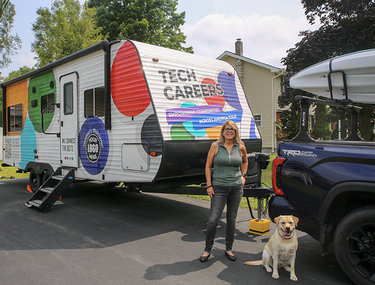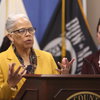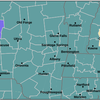Helping human stars to form, Carey markets Nebula Academy by traversing the U.S.
When Laurie Carey graduated from Guilderland High School in 1980, she didn’t know what she wanted to do with her life.
Now she is trying to reach young adults who, like herself nearly a half-century ago, don’t have a clear career path in mind.
Carey is promoting an online tech program she founded by traveling the length of the country in a recreational vehicle, which she calls “a moving billboard,” emblazoned with colorful dots and the words “Tech Careers: Empowering Communities Across America Tour.”
“We’ve been to 16 states in six months,” she said.
The door to her solar-powered RV says, “We Connect the Dots,” which is the name of her not-for-profit organization linked to the Nebula Professional Development Academy.
She chose the name with care.
“A nebula is where stars are born,” Carey says, using the word “stars” in both the literal sense and metaphorically, to refer to the students who have graduated from her tech training program to go on to careers in the field.
From the Latin word for a fog, a nebula is a cloud of dust and gas that serves as a nursery for new stars much as the academy’s stars emerge from the fog of their youth.
Carey is traveling with her golden Labrador retriever, Echo.
While an aging John Steinbeck traversed the country in 1960 in his camper with his dog, Charley, to discover and write about the “new America,” Carey is aware of a still newer America permeated with technology.
She wants to help people find a path in this brave new world.
“A lot of people think they have to have a college degree and spend a lot of money to enter the field,” she said.
Carey has proven that wrong by training people who have been incarcerated or people with disabilities or people who simply “feel stuck” by having them learn coding skills in an online “boot camp” that includes social and emotional support for learning.
Carey grew up on Altamont’s Leesome Lane, a member of the close-knit Pollard family that enjoyed vacations in an RV.
“I married at 18,” she said. “I was not sure what I wanted to do.”
She worked since she was old enough, at 16, at the nursing home in Guilderland Center. At 19, she got a job in manufacturing, building circuit boards.
“That started me in the tech industry,” Carey said. She earned industry certifications along the way, moving to Long Island and working for Microsoft for a decade.
As the only female on her team at Microsoft, Carey said, she helped with an initiative to make the company more diverse.
She says she took a corporate program at Microsoft, DigiGirlz, to make it available to a wider range of girls on Long Island including girls in foster-care programs.
“We created a playbook model that New York and other states and other countries could use,” she said.
Creating code, Carey said, has “a dopamine effect.” A girl says to herself, “Oh, my god, I did this; it feels really good,” Carey said.
She acknowledged there would be failures along the way. “It’s becoming comfortable being uncomfortable in a man’s world,” she said of the process that leads to success.
Nebula Academy
In 2013, Carey was part of the General Management Program at Harvard University — one of 16 women in a class of 123 students, she said — where she developed her “We Connect the Dots” program.
“This was a personal project I was paying for myself,” she said.
She focused on teaching young adults, ages 13 to 18, how to work with diverse people and ran the not-for-profit for three years while still working at Microsoft.
With help from her Harvad professor, she then launched the for-profit Nebula Academy.
“When Covid hit, we had to go online,” Carey said. “It was easy for us to move to digital.”
On Long Island, Carey worked with community partners who were supporting young adults already. Some of her students came through the Council of Thought and Action, COTA, program.
COTA is a grassroots movement developed by Suffolk County’s Deputy Police Commissioner Risco Mention-Lewis in 2008, responding to communities that are economically or socially repressed, to change the mindset of residents through council meetings where members can discuss the week’s events and evaluate what needs to change.
In an online interview with Carey, Mention-Lewis said of reducing shootings and violent crime among youth, “If you can get them a career, they just move on to something else because they’ll realize their own value.”
Both COTA and Carey’s program focus on social and emotional learning, which Mention-Lewis said, engenders “a sense of value.” Many young people lose jobs, she said, because of a lack of social-emotional intelligence rather than because of a lack of skills.
Mention-Lewis said the Nebula program is valuable even for students who don’t end up pursuing tech careers. She cited a young man who suffered trauma after being shot. “He went from being broken and fractured to healed,” she said and, after the program, was able to trust others.
She also spoke of a woman who had been in federal prison for two years and, through the Nebula training, was able to get a tech job and support her newborn baby.
Mention-Lewis said her own son, whom she described as a high achiever and college graduate from a high achieving family, attended the Nebula program — “I paid full price for my son,” she stressed — and benefited because it “gave him a routine.”
Mention-Lewis also made a plug to taxpayers on the value of the program, noting that in New York state, prison costs $60,000 a year for each adult prisoner and up to $200,000 annually for a teenager.
Another online interview featured Abraham Johnson, a young man who liked playing video games as a kid and, after taking the Nebula program, had secured a job with LinkedIn, motivated by his family.
“Just learn how to code …,” Johnson urged. “There’s a space in the field for you … It’s not going to beat up your body.”
Carey took to the road this year, she said, because “marketing is really hard.” People trying to rebuild their lives, she said, often aren’t aware of the opportunities.
Her sister in Albany was selling her RV so Carey hitched it to her trusty Toyota Tundra, had it converted to solar, and began her travels, stopping to talk to media outlets along the way.
“Everybody thought it was crazy,” she said.
Carey wanted to get into rural as well as urban areas. When she pulls into RV parks, she often meets retired teachers who see the signs on her RV and are eager to learn about what she is doing.
She says the Workforce Innovation and Opportunity Act “makes this obtainable for anyone.” If someone is unemployed or underemployed, Carey said, “most of our programs are free” and candidates can consult with the workforce board in their county to learn more.
Albany, Rensselaer, and Schenectady counties together are part of the Capital Region Workforce Development Board.
“If they’re not unemployed or underemployed, they can apply for student loans,” Carey said. She stressed, “Not every student is right for our program. They need the grit and tenacity to stick it out. We can guarantee them an interview, not a job.”
Nebula Academy’s boot camp is five months for full-time students and nine months for part-time students.
On the road
Carey, with Echo, started her journey in January in Florida. She crossed Georgia, Alabama, Mississippi, Louisiana, and drove as far west as San Antonio, Texas before heading northeast through Arkansas, Tennessee, Kentucky, Ohio, and Pennsylvania.
Carey then drove west through Ohio and Indianna to Chicago before going north through Michigan and across Canada to upstate New York. She then, as mapped on her website, turned south, driving through New Jersey, Maryland, Delaware, Virginia, and North Carolina, going as far as Charlotte.
Carey plans to make a West Coast tour next year. She also plans to move her base of operations from Long Island to the Capital Region where she was raised.
Along the way, she has kept a blog that records her vision for the journey along with the vicissitudes of travel.
Of her very first stop, in St. Cloud Florida, Carey writes, “As Echo and I continue on this journey, we carry with us the lessons of St. Cloud: adaptability, curiosity, and the beauty of forming new connections, both with nature and technology.
“Stay tuned for more stories from the road as we explore what it means to work remotely, live minimally, and embrace the vastness of the country with open arms and an open heart.”
In April, as Carey had the nerve-wracking experience of having to park her RV without a pull-through space, by backing, she wrote, “I often think about our bootcamp students, and how many times my team and I have had to help a student push past their fear so that they don’t quit the program.
“Quitting is easy; it temporarily relieves the brain of all that anxiety. But that relief is short-lived, and a better path forward is to push just a little further to experience that rush of accomplishment.
“Recognizing that feeling and telling your brain that you want more of it is what drives momentum and pushes you forward. It’s thrilling to achieve something you once thought was not possible. Taking a moment to acknowledge that feeling and celebrating it can help create the momentum necessary to keep learning, keep feeling uncomfortable, and keep moving towards goals that can positively change you forever.”
In May, Carey wrote of visiting a former student, Lucian Bryan, in San Antonio. He had been referred to the software engineering boot camp by COTA after getting out of prison.
“New to coding, Lucian struggled initially but made extensive use of our resources — instructors, coaches, and office hours — to overcome his challenges,” Carey wrote. “Supported by his cohort and our team, he moved from feeling incompetent to gaining competency.
“Lucian’s prior mechanical experience, combined with his new training, helped him secure a role as the head of the technical division for a dewatering company in Texas. Now thriving, he has started a family and looks forward to a future where he can meet any challenge.”
In another May entry, Carey reflects on laundromats, recalling an experience from her youth.
“Picture this: a 19-year-old me, helping my large in-law family with their weekly laundry, accompanied by my then 8-year-old inquisitive brother-in-law. As he sat swinging his legs inside the massive dryer, he pestered me with questions about what would happen if the door closed with him inside.”
She popped him inside to assure him nothing would happen only to have the dryer start to spin. “After a frantic scramble to rescue him, needless to say, my brother-in-law never questioned my laundry methods again, nor did he volunteer to accompany me to the laundromat,” Carey writes.
She goes on to reflect how cumbersome coins are no longer needed but notes that the new technology can stymie some.
“On one occasion, a woman entered the laundromat, frustrated and clutching a bag of coins, bewildered by the card-only machines,” Carey writes. “This moment transformed into a teaching opportunity — not just about how to use the new system, but also managing the emotional upheaval that often accompanies technological change.”
In Houston, she marveled at a laundromat where each machine had a QR code and could be operated with a smartphone.
“While I helped those less tech-savvy with these high-tech wonders, I cherished the connections made, like with a fellow educator and mom,” wrote Carey. “Our shared experience at the laundromat led to a deep conversation about our roles in training teachers in computer science, highlighting how these everyday encounters can weave into larger community narratives.”



